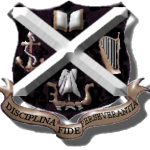Physics is a subject which many people see as essential to understanding the world around us. It’s the how things work and why. It is reputedly the most fundamental Science subject and encompasses everything in the Universe, from the smallest atom to the largest galaxy.
Physics is about finding out how the universe works. Over the centuries, by doing Physics, scientists have gained some knowledge of the workings of the Universe and have used that knowledge to develop civilisation and give us the lifestyle we enjoy today. For example, different methods of electricity generation provides us with the energy needed for our TVs, microwaves, hairdryers, heating systems etc. We will follow in the footsteps of scientists and their discoveries about light, sound, pressure, space and many other areas.
Studying Physics helps your analytical skills, enhances problem solving and generally just makes you think logically.
The aim of the Physics Department is to provide pupils with a wide knowledge and understanding of Physics and its applications and an ability to apply this knowledge to unseen challenges and situations.
This is done through the provision of a high quality of teaching and learning, following the syllabuses laid down by the Scottish Qualifications Authority.
Staff
Gavin Crawford – Teacher of Physics
Robert MacNeilage – Teacher of Physics
Vision Statement
In order to address our aims we have the following objectives:
- To promote an appreciation of the world around us and to encourage pupils to use their developing skills to investigate our environment and our role within it.
- To enable our pupils to reach their full potential, and obtain as high a qualification as they are capable of, so that they can take full advantage of the rewards of that success.
- To allow pupils to develop their life skills, both socially and academically.
- To assist pupils to see the relevance of physics to their everyday life
- To assist pupils in assessing evidence about environmental, social and moral questions relating to physics and its applications.
- To encourage pupils to enjoy the study of physics.
- To prepare pupils to go on to further study in physics and applied physical science subjects.
The Faculty’s overarching vision, values and aims are embodied in our aspirational motto ‘Dedicated to excellence’.
Course Information
BGE
The course is an excellent balance of theory and practical (experiments) and by completing this course; learners will develop important and relevant skills, attitudes and attributes related to physics, including: scientific and analytical thinking skills; an understanding of the role of physics in industry and the environment and understanding of relevant applications of physics in society.
Course Content – Electricity and Energy
Conservation of Energy
Electric charge carriers and electric fields
Voltage
Practical electronic and electric circuits
Ohm’s Law
Electrical power
Specific heat capacity
Gas laws and the kinetic model
As well as developing specific scientific and investigative skills, learners will also gain valuable transferrable skills, for learning life and work.
Senior Phase Information
The main units of study for National 4 and National 5 are outlined below and although these units are similar in content there is a greater degree of difficulty within the National 5 course. Learners will be opting for the subject and not the level of study. This will be discussed and decided by the class teacher.
The following links provide detailed information and documents from the SQA relating to the courses offered in the senior phase.
National 4 Physics www.sqa.org.uk/sqa/47425.html
National 5 Physics www.sqa.org.uk/sqa/47430.html
Unit 1 – Electricity and Energy
- Energy conservation;
- Heat
- electricity
Unit 2 – Waves and Radiation
- Waves
- Nuclear radiation
- Motion
Unit 3 – Dynamics and Space
- Forces and gravity
- Information from space
- The position of the Earth in our universe
The Higher Physics Course develops learners’ curiosity, interest and enthusiasm for physics in a range of contexts. The skills of scientific inquiry and investigation are developed throughout the Course, and the relevance of physics is highlighted by the study of the applications of physics in everyday contexts.
The unit topics for Cfe Higher Physics are listed as:
Electricity and Energy
The Unit covers the key areas of: Monitoring and measuring a.c., Current, potential difference, power and resistance, Electrical sources and internal resistance, Capacitors, Conductors, semiconductors and insulators and p-n junctions.
Our Dynamic Universe
The Unit covers the key areas of:
Motion – equations and graphs, Forces, energy and power, Collisions, explosions and impulse, Gravitation, Special relativity and The Expanding Universe.
Particles and waves
The Unit covers the key areas of:
The standard model, Forces on charged particles, Nuclear reactions, Wave particle duality, Interference and diffraction, Refraction of light and Spectra.
Learners will research issues, apply scientific skills and communicate information related to their findings, which will develop skills of scientific literacy.
Learners who complete this Unit will be able to:
1 Apply skills of scientific inquiry and draw on knowledge and understanding of the key areas of this Unit, to carry out an experiment/practical investigation
2 Draw on knowledge, and understanding of the key areas of this Unit and apply scientific skills
Research in Physics
The general aim of this Unit is to develop skills relevant to undertaking research in Physics. Learners will collect and synthesize information from different sources. They will plan and undertake a practical investigation and analyse results.
The Unit offers opportunities for collaborative and independent learning. Learners will develop knowledge and skills associated with collecting, recording and processing information from a number of different sources. Equipped with knowledge of standard laboratory apparatus, they will plan and undertake a practical investigation related to a chosen physics topic.
Course structure
There are three knowledge based units and one research based unit.
The three knowledge based units are assessed by means of an end of unit test that assesses knowledge and understanding and problem solving. In addition, one practical investigation must be submitted.
Physics: Rotational Motion and Astrophysics (Advanced Higher)
This Unit develops knowledge and understanding and skills in physics related to rotational motion and astrophysics. It provides opportunities to develop and apply concepts and principles in a wide variety of situations involving angular motion. An astronomical perspective is developed through a study of gravitation, leading to work on general relativity and stellar physics.
Physics: Quanta and Waves (Advanced Higher)
This Unit develops knowledge and understanding and skills in physics related to quanta and waves. It provides opportunities to develop and apply concepts and principles in a wide variety of situations involving quantum theory and waves. The Unit introduces non-classical physics and considers the origin and composition of cosmic radiation. Simple harmonic motion is introduced and work on wave theory is developed.
Physics: Electromagnetism (Advanced Higher)
This Unit develops knowledge and understanding and skills in physics related to electromagnetism. It provides opportunities to develop and apply concepts and principles in a wide variety of situations involving electromagnetism. The Unit develops knowledge and understanding of electric and magnetic fields and capacitors and inductors used in d.c. and a.c. circuits.
Investigating Physics (Advanced Higher)
In this Unit, learners will develop key investigative skills. The Unit offers opportunities for independent learning set within the context of experimental physics. Learners will identify, research, plan and carry out a physics investigation of their choice.
Physics pupils will be supplied with a wide range of resources and support to ensure they maximise their potential with us. This includes text books, electronic resources and opportunities for supported study. These resources are regularly updated and will be shared with students at the onset of courses.
Important Deadlines
Deadlines for each level will be shared with pupils and parents via a range of media – including direct texts and email.
Any other information
Please follow the Dunoon Grammar twitter feed @dunoongrammar1 for the latest news from Physics
Scientific Studies
Course Description Scientific Studies is one of the subjects delivered by the Science Faculty. The aim of this course is to provide pupils with a
Science
Science is an important part of our heritage and we use its applications every day in our lives at work, at leisure and in the
Environmental Science
Environmental Science is one of the subjects delivered by the Science Faculty. The aim of this course is to provide pupils with a broad experience
Physics
Physics is a subject which many people see as essential to understanding the world around us. It’s the how things work and why. It is
Chemistry
Chemical reactions occur almost everywhere. Inside your body, chemical reactions break down your food and give you the energy you need to live. In cooking,
Biology
Biology is the study of living organisms, including their structure, function, evolution, distribution and the relationships they have with each other. It is an exciting

